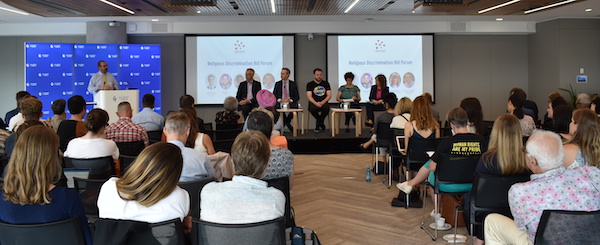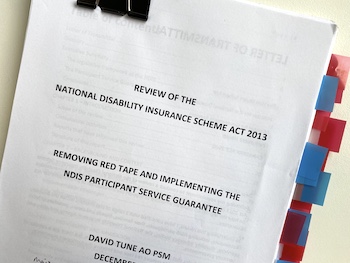
Achieving Social Justice – May 2020 Update
A win for police accountability
Following sustained advocacy by PIAC and others, in February the Law Enforcement Conduct Commission (LECC) released a report into use of the Suspect Targeting Management Plan on children and young people, calling for extensive changes to the STMP policing practices.
The STMP is a secret NSW Police policy that is used by police to target individuals for proactive attention. ‘Targets’ on the STMP are often repeatedly searched by police and/or visited at home at all hours of the day.
The LECC investigation ‘showed patterns of targeting that appear to have led to unreasonable, unjust and oppressive interactions for young STMP targets’ and revealed that a disproportionate number of young people targeted by these strategies are Aboriginal.
We are continuing to call for NSW Police to stop using the STMP on children, and for greater transparency and accountability in the application of the policy.
Religious Discrimination: an influential voice in the debate
PIAC has played a leading role in responding to the Government’s Second Exposure Draft Religious Discrimination Bill.
While we support a law that protects people from discrimination on the grounds of religious belief, our analysis shows that the draft legislation has the potential to have a serious negative impact on the enjoyment of rights across the community.
PIAC has worked co-operatively to share our legal expertise and support individuals and groups to respond to the Bill: providing advice to peak bodies, faith and civil society organisations.

We have also provided an influential voice in the media and through engagement with government and parliamentarians. We have highlighted our concerns that the Bill is unnecessarily complex and unworkable in practice; likely to permit more discrimination than it prevents; and will create divisions in society, rather than promoting tolerance.
In January this year we presented a public forum to inform the public debate, with a keynote speech by Human Rights Commissioner Edward Santow, and a panel of legal and human rights experts, and community voices.
Read the submission and related media article.
Breakthrough to lower electricity prices and emissions and help prevent blackouts
PIAC has achieved a breakthrough in the wholesale energy market to allow for a demand response mechanism. Demand response allows people to be paid to use less energy when demand is tight, instead of turning on more generators. This puts downward pressure on wholesale energy prices, improves the reliability of the energy system without needing more expensive generators and lowers emissions. It has been on the national energy reform agenda for almost 20 years.
Responding a proposal from PIAC, the Australia Institute and Total Environment Centre, the Australian Energy Market Commission made a draft rule to introduce wholesale demand response for large energy users in 2022. In response to PIAC’s call for the change to take effect earlier, the Commission made a new draft rule in March to introduce demand response in 2021.
PIAC will continue to work to ensure the final rule is implemented as soon as possible and to develop ways for NSW households to participate in demand response despite not being included in the initial national mechanism.
A fairer NDIS
 PIAC is working to improve the transparency and consistency of decisions under the National Disability Insurance Scheme.
PIAC is working to improve the transparency and consistency of decisions under the National Disability Insurance Scheme.
In December 2019, the Joint Parliamentary Standing Committee on the National Disability Insurance Scheme unanimously adopted our recommendation that the National Disability Insurance Agency publish deidentified information about the outcomes of Administrative Appeals Tribunal (AAT) cases.
This is an important step towards ensuring the NDIS works as it should for people with disability.
While around 96% of cases before the AAT involving the NDIA were finalised by settlement, settlement outcomes are not currently made public. This makes it difficult for participants in the scheme to see what supports and funding are provided to people in similar situations and hold the NDIA accountable.
The publication of settlement outcomes will help to reduce the number of inconsistent decisions being made by the NDIA, where even brothers with similar impairments have been reported to receive very different support packages.
We are working with peak disability organisations to call on the NDIA to implement the committee’s recommendations as a matter of urgency.
‘Unjustified and oppressive’: Police watchdog to audit bail compliance checking
 The NSW Law Enforcement Conduct Commission (LECC) will undertake a state-wide audit to ensure NSW Police have a consistent approach to conducting bail compliance checks on people in their homes, after their investigation found the timing and frequency of ‘proactive’ bail checks on a young Aboriginal man in Newcastle in 2014, without a Court order, was ‘unjustified, unreasonable and oppressive’.
The NSW Law Enforcement Conduct Commission (LECC) will undertake a state-wide audit to ensure NSW Police have a consistent approach to conducting bail compliance checks on people in their homes, after their investigation found the timing and frequency of ‘proactive’ bail checks on a young Aboriginal man in Newcastle in 2014, without a Court order, was ‘unjustified, unreasonable and oppressive’.
PIAC is acting for the man and his partner who were visited by the police at home at all hours of the night, sometimes multiple times per night, and over several months, despite police never suspecting he had breached his bail conditions.
The LECC’s investigation followed PIAC’s landmark case in the District Court of NSW testing the powers of police to enter private land to conduct ‘proactive’ curfew checks without a Court order. PIAC maintains that the NSW Police approach to bail compliance checks is inconsistent with the Bail Act, and that this case is indicative of a systemic problem.
The audit announced in April by the LECC is an important step towards ensuring that bail compliance checks are undertaken lawfully and in a way that minimises the negative impact on families and communities.